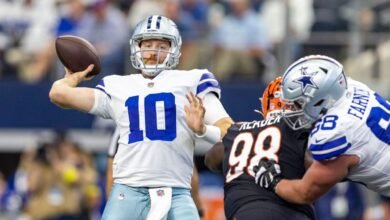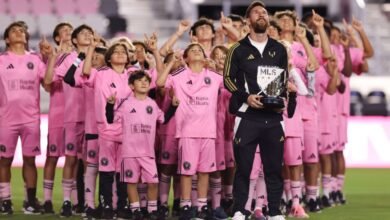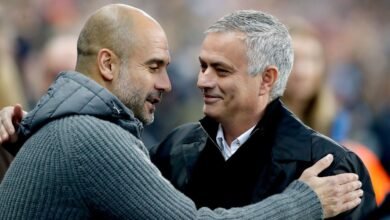Why Dodgers’ World Series title vindicates Dave Roberts

Blake Treinen glanced toward his dugout, saw manager Dave Roberts emerge from it and, for a moment, felt demoralized. There were two runners on with one out in the eighth inning. The Los Angeles Dodgers clung to a one-run lead, a Yankee Stadium crowd of close to 50,000 people had sprung back into life, and Treinen, navigating his third inning, was exhausted. But a title was only five outs away. Giancarlo Stanton, the man due up, was supposed to be his primary matchup. Treinen didn’t want to leave — and Roberts didn’t intend to intervene.
He arrived to encourage. To comfort.
Roberts, near the end of his ninth tension-filled October as the Dodgers’ manager, placed both of his hands on Treinen’s chest to calm his nerves.
“Focus up,” Treinen recalled hearing. “This is your last guy.”
Roberts looked on from the dugout as Treinen induced a harmless popup to Stanton on the first pitch. When he saw Freddie Freeman wave him off out of the corner of his eye, he trusted his first baseman’s instincts and let Treinen stay for another hitter, Anthony Rizzo, and roared when it resulted in an inning-ending strikeout. In the ninth, with no legitimate reliever options left, he turned to Walker Buehler — a starter who hadn’t pitched out of the bullpen since 2018 — and watched as he retired three consecutive New York Yankees with ease.
The Dodgers had clinched a championship, the culmination of a month in which Roberts seemed to push every correct button. He trusted when it felt right, interceded when he needed to, went off script when moments demanded and navigated October with a keen sense for the pulse of his team. It was most obvious at the very end, in Game 5 of the World Series on Wednesday night — 24 hours after a bullpen game, with his starting pitcher recording only four outs, while using a record seven relievers in a title clincher.
“That’s one of the best games I’ve ever seen managed,” said Freeman, the World Series MVP. “That was special.”
For close to a decade, Roberts has been the most front-facing member of an organization that continually excelled during the regular season and came up short in the playoffs. Every dominant summer was credited to a star-laden roster and an astute front office, leaving Roberts to absorb the blame when things went wrong in the fall.
This October, though, served as Roberts’ stage for vindication — and might have cemented his place in the Hall of Fame. His maneuvering mitigated a short-handed starting rotation. His optimism anchored a team in desperate need of it.
“To be honest, Dave is the real reason why we’re here,” Mookie Betts said amid a raucous champagne celebration inside Yankee Stadium’s visiting clubhouse. “I know there’s a lot of talk about Doc, but Doc is the best, man. Doc loves each and every person in here, Doc has confidence in each and every person in here, Doc never lost confidence in anybody in here. And no matter what we went through, he was always positive.”
The defining moment, many of his players have said, actually came in September — specifically, Sept. 15 in Atlanta.
Tyler Glasnow was among the headliners of the Dodgers’ $1 billion offseason, brought in to anchor a rotation that underwhelmed in recent Octobers. But Glasnow’s elbow wasn’t responding. On Sept. 14, scans revealed he had suffered a sprain that would end his season, the latest in a string of devastating pitching injuries that would befall the team.
The Dodgers proceeded to suffer another listless loss to the Atlanta Braves that night, their seventh defeat in 12 games. The Arizona Diamondbacks and San Diego Padres were nipping at their heels for the top of the division, and the Dodgers didn’t know if they’d have enough pitching to get through October.
“It just felt like the entire year we kept getting dealt blow after blow,” third baseman Max Muncy said. “And then guys would come back, and then another blow, and guys would come back. It finally felt like we were turning the page and starting to see more guys come back than go down. Then your big pitcher gets told he can’t pitch the rest of the year, and that was kind of like, ‘Man, not again.’ It was just a big kick in the gut.”
Roberts isn’t one for team meetings; he prefers individual conversations with players. But on the afternoon of Sept. 15, it felt appropriate. That it was Roberto Clemente Day provided an ideal entry. He presented it as an opportunity to educate players on Clemente’s legacy, but mostly used it to offer them an important reminder: that so many All-Stars, MVPs and future Hall of Famers still dotted their clubhouse. That they still possessed more talent than any other team in the sport, regardless of who might no longer be available. That they were still good enough to win it all. That night, the Dodgers handily beat the Braves while on their way to winning 11 of their final 14 regular season games.
Roberts’ positivity has defined his managerial career, and this team might have needed it more than any other.
“He is an eternal optimist, the way he breathes that into our guys,” Dodgers president of baseball operations Andrew Friedman said. “This year we had more adversity and different guys and guys feeling the weight of that. And for them to continue to breathe that optimism, talk about how many good players we still have in here, I think was a meaningful part of us finishing strong and doing what we did in October.”
Roberts navigated the Ippei Mizuhara betting scandal, which prompted the firing of Shohei Ohtani’s longtime interpreter. He supported Freeman while his young son fought through a temporary bout of paralysis. On the field, he massaged a delicate situation around another superstar, Betts, who transitioned from second base to shortstop and later had to accept a return to right field and a move out of the leadoff spot. He maneuvered through a jarring string of injuries — from Betts to Muncy, Yoshinobu Yamamoto to Glasnow, Treinen to Brusdar Graterol. And he got the Dodgers through October while routinely staging bullpen games.
“It’s gratifying,” Roberts said. “The players performed, and yeah, I put them in positions that I felt were the right positions and the decisions worked out. But a lot of it is the trust that my guys have in me. And that’s everything. I believe in them. And this is the first team that I felt really like the trust went both ways. And that regardless of whatever decision I made, they were going to support me 100 percent.”
The full buy-in this year, Roberts said, came because the likes of Freeman, Betts, Muncy and Hernandez “were my biggest supporters.”
“I just think that from there, everyone sort of really, really had full trust.”
Since Roberts took over for the 2016 season, the Dodgers have posted a .627 regular-season winning percentage — the all-time highest for any manager (minimum 250 games). That stretch included only one championship, captured amid the pandemic-shortened 2020 season. Leading the Dodgers to another, giving them their first full-season title since 1988, put him alongside Walter Alston and Tommy Lasorda as the only Dodgers managers to win multiple rings.
“It should mean everything to him,” Dodgers first-base coach Clayton McCullough said. “It should mean for all those that ever doubted, ever criticized, to never do it again — to trust in what this guy is doing.”
A championship is the culmination of every aspect of an organization. It was ownership that green-lit the massive financial commitments over the winter. It was the front office that made critical additions at midseason. It was the training staff that worked diligently to navigate Freeman through his string of injuries in October. It was the scouting department that spent weeks finding holes for the Dodgers to expose in the World Series. And it was the players who, in the midst of adversity, rallied together.
But Roberts’ fingerprints were everywhere.
“I’m proud of it,” Roberts said, his uniform soaked in champagne as he left the interview room inside an emptying Yankee Stadium after the World Series win. “Legacy is something that I’m proud of. I’m a baseball fan. I think I do right by the game. I love players; I think I do right by the players — players that play for me, players that compete against us. I think that my loyalty to the Dodgers, the fan base, the organization, are my priorities. To win another championship, I guess I’ll let people talk about my legacy. But I’m just very proud of this group of men.”
Source link



